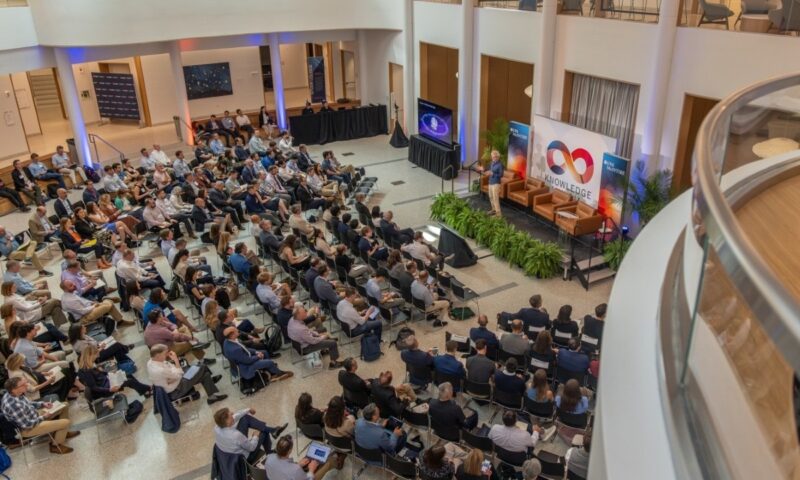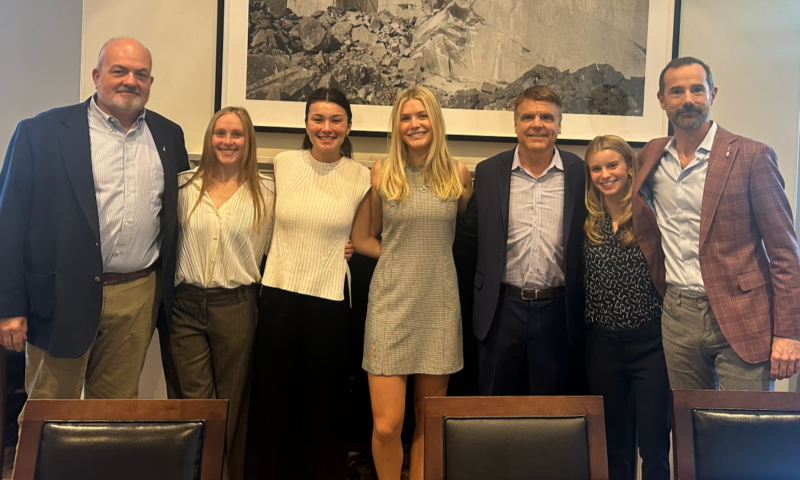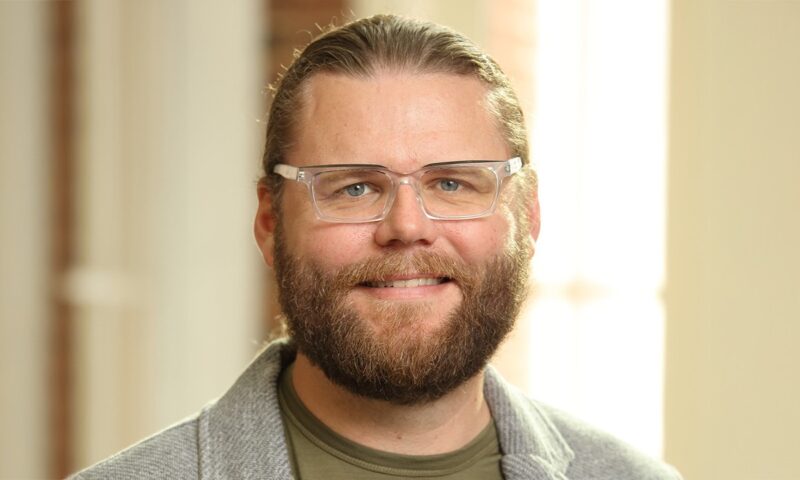Picture a course description overflowing with details like going on safari to watch cheetah stalk impala, a stay in Nelson Mandela’s villa, learning about educational challenges from fellow students and social issues by those who lived through Apartheid, and meeting with national leaders to discuss the opportunities and difficulties of investing in South Africa.
Not impressed? What if the description also mentioned stopping in the United Arab Emirates for a day-long visit at the Abu Dhabi Investment Council and checking out one of the world’s largest mosques? Other itinerary entries include taking a liberating run down the red sand dunes of the planet’s largest uninterrupted desert, a camel ride at dawn, and a meal with a former high-ranking political figure from the region, who openly discussed the Middle East’s future.
If you insisted that the course should also give you the opportunity to meet with the famously inspirational “Warren Buffett of China” Lei Zhang, enjoy a hike to the top of Victoria Peak, and savor a few visits to the Old China Club in Hong Kong, then you’re probably dreaming.
Unless, of course, you were one of the lucky few UVA students selected for the McIntire School’s “World of Investing & International Relations” course this past January.
An Actionable Idea
If all of the above sounds incredible, that’s because it is. But like anything worth doing, it took some big ideas and some serious planning.
The man behind the course, triple Hoo Dave Burke (McIntire ’88, Law ’93, A&S [M.A. in International Relations] ’94), was already an active alumnus, but he was driven by a desire to go further and work with UVA students in a more direct and sustained way. Though he served on the board of the UVA Law School and the University’s investment management company, UVIMCO, and was also involved with organizations like Jefferson Scholars, he felt restricted by a disconnect and a lack of interaction with the students he was helping. It wasn’t until he spoke with McIntire Professor and Associate Dean for Global Affairs Peter Maillet at a dinner in London in fall 2016 that he learned about McIntire’s January-term course offerings—and thought about the possibility of developing a J-term class himself.
The CEO and Founder of Bay Area investment firm Makena Capital had taught in the past, giving one-off classes at Stanford’s business and law schools. And while he was interested in bringing his expertise to Grounds, the prohibitive distance and his other life commitments made it impossible to propose a semester-long course. But the idea of introducing students to the world of global investing through a whirlwind two-week tour of South Africa, UAE, and Hong Kong suddenly became the most viable and fitting way for Burke to engage with students while giving them an extraordinary view into the political, cultural, and entrepreneurial underpinnings of the global financial system. Thus, with some heavy lifting by UVA Student Affairs Project Coordinator Meg Gould (A&S ’15), former U.S. Ambassador to Sweden Mark Brzezinski (Law ’91), and Makena Executive Kia Ghorashi (A&S ’09), “World of Investing” was born.
The Right Mix
With Gould selecting the 12-student cohort (with seven representing the Comm School), the team assembled itself in Johannesburg, South Africa, on New Year’s Day, ready to meet the lofty goals of this ambitious learning journey. Burke insists that the class dynamic was the most important factor in the course’s success, and to that end, “World of Investing” and all its travel expenses were fully funded by a program scholarship grant he spearheaded, with the intention of attracting “the most diverse and dynamic mix of students, irrespective of family means.” As a result, this uniquely hands-on and ultimately student-run program allowed the participants to learn from each other, debate perspectives, and share their life stories with the group and the guest business leaders, investors, ambassadors, foreign ministers, entrepreneurs, and journalists with whom they shared conversations.
“The students themselves moderated all of the sessions in pairs, giving them the opportunity to research and design the questions to be asked and to do the actual asking,” Burke says. That empowerment was aimed to arm the students with the necessary confidence in their abilities to envision themselves as peers of the leaders with whom they were sharing a table. Owning the sessions also freed them from relying on instructors to guide interactions and strengthened their self-reliance—a necessary skill for any traveler exchanging ideas and finding their way in a new place.

The group learns about South Africa’s ecosystem during a safari at Shambala Private Game Reserve.
Starting in South Africa
A five-night stay near the University of Cape Town gave the students a chance to bond while touring the area’s rich cultural and historical sites. After getting to know each other and gleaning some local perspective from city residents, the group headed to the Shambala and Madikwe game reserves. On the safari, they learned about the region’s ecosystem through intimate encounters with some of the most majestic and fearsome animals on the planet, and at the former reserve, enjoyed the aforementioned stay in Mandela’s personal villa—a once-in-a-lifetime experience.
Shifting their focus to financial and political concerns upon arriving in Johannesburg, the group met with some of the nation’s top investors: Richard Okello (Founder of Sango Capital), Duncan Randall (Tana Africa Capital Managers), and James Teeger (Oppenheimer & Son [PTY] Limited). Speaking at length about the nuances of the culture of African companies and countries, Okello explained how his business interactions depended on a keen awareness of cultural context; maintaining his relationships with 25 different African national leaders remains contingent on staying cognizant of each state’s vastly distinctive culture.
Throughout the conversations, students learned about the complexities firms faced when operating within the confines of a broken political environment, one more recently characterized by an unstable government mired in debt and corruption. The guests also spoke at length about the country’s future being tied to its ability to support education. The “brain drain” issue greatly affects the youth-heavy population, as 66% of South Africans are under 35 and lacking considerable access to educational resources. Teeger noted how business people such as the Oppenheimers, Randall, and Chris Bradford from the African Leadership Academy (ALA) were taking major strides to boost learning initiatives across the continent.
At a dinner with ALA students, the UVA group took a deeper dive on the subject, and saw how the South African students are striving to achieve and give back to their country in spite of the difficulties. Equally as important, their time together revealed the common ground that the undergraduates shared.
Third-year Commerce student Kate McGinn says speaking with a Kenyan ALA student named Michelle was particularly moving for her. “We had so many parallels and similarities between our lives, our passions, and our ambitions. Like me, she wants to make a social impact by using business for good.” With many new connections made, and an appreciation for opportunities in shaping business and democracy, the UVA team saw the vast impact investors in South Africa can also have in transforming the nation’s young population.
Before embarking on the next leg of their excursion, the group had the chance to have a fireside chat with legendary philanthropist and retired businessman Nicky Oppenheimer (formerly of Anglo American Corporation and De Beers Group), who taught the group about ethical dilemmas in wildlife conservation, an issue of great importance to the environmental- and conservation-minded family.
Entrepreneurship in the UAE
At its next stop in the United Arab Emirates, the group had the incomparable opportunity of witnessing a nation in the midst of creating its future through the cultivation of a quickly evolving entrepreneurial landscape.
To get a handle on the many influences and interests at play, students met with political leaders keyed into UAE’s visionary management of economic growth, one that has melded traditional values with progressive ideals. In Dubai, they learned firsthand about how the Persian Gulf nation has welcomed avenues for new tech ventures to diversify its economy from its longstanding dependence on oil. A conversation with successful startup founder Magnus Olsson, who was responsible for launching Careem—known as the Uber of the Middle East—provided an exemplary view of this novel paradigm.
Trekking to the desert resort of Qasr al Sarab, the “World of Investing” crew was greeted by the dazzling sight of the sun setting on the Saudi border. Later, an evening hike to one of the desert’s highest sand dunes provided the perfect spot for gazing at shooting stars alighting the night sky.

The group visits the Abu Dhabi Investment Council.
Shifting back to business mode in Abu Dhabi, students engaged in insightful meetings, beginning with visit to the home of former Managing Director of the Abu Dhabi Investment Council (ADIC) Khalifa Mohammed al Kindi. He explained in greater detail how the UAE intends to liberate its economy by nurturing a startup ecosystem and investing in a diverse array of assets. Afterward, they spent the day visiting the ADIC headquarters itself.
The Middle East leg of “World of Investing” concluded with a look into the region’s political complexities, thanks to Steve Bondy from the U.S. Embassy in the UAE and Marwan Muasher, an ex-Foreign Minister and Deputy Prime Minister of Jordan, who now serves as Vice President for Studies for the Carnegie Endowment for International Peace. During dinner with Muasher, he stressed the inextricable relationship between economic and political change, highlighting a key lesson of the course. With a UAE-aligned political perspective, students remarked that he challenged their way of thinking about democracy and the role of government. Despite the ideological differences, his genuine approach, intelligent perspective, humility, and sense of humor seemed to strongly resonate with the group, leaving an indelible and positive impression on them as they continued east to China.
Hong Kong’s Party Politics and Financial Growth
In the dense financial hub of Hong Kong, the “World of Investing” class enjoyed interacting with guests who offered contrasting viewpoints about life and work in this unique and important city.
The students learned how businesspeople have been succeeding within the rapidly growing economy of the “special autonomous territory” that maintains separate political and economic systems from mainland China. The group began its remaining third of the course with lunch at the China Club, featuring guest speaker Eric Li, Founder and CEO of Chengwei Capital. Li spoke at length about the pitfalls of the U.S. government’s attempts to install democratic states across the world, and provided new insights on U.S.-China affairs. Speaking about the conversation afterward, many students noted the eye-opening conversation prompted them to grapple with their inherent American bias, especially in light of China’s commercial successes under its one-party system.
For a different perspective, a discussion with Financial Times Asia Editor Jamil Anderlini provided a Western take on the political climate. Having spent more than a decade as a New Zealander covering mainland Asia, he provided the students further detail on the differences between daily life in China and the United States. Anderlini’s experiences served as more than simply a counterpoint to Li: Both guests spoke about the intrinsic flaws and strengths in all political systems, while revealing the need to remain objective about one’s own society.

In Hong Kong, the students met Lei Zhang, Founder and CEO of Hillhouse Capital Group.
To close out the trip, the students had the honor of meeting Lei Zhang, Founder and CEO of Hillhouse Capital Group. The low-profile “Warren Buffett of China” imparted some wisdom that many students said touched them profoundly. He emphasized the importance of spending “quality time with quality people,” a phrase that encapsulated the entire “World of Investment” course. Zhang defined quality people as possessing intellectual curiosity, intellectual honesty, and intellectual independence—the same characteristics that the students and professors brought to the course to make it such a rewarding trip.
Priceless Advice, Lifelong Lessons
Looking over the J-term class’s itinerary, it might read like a tightly packed schedule of wall-to-wall discussions and constant shuttling by plane, bus, and car. But Burke says the course was actually designed to allow for quality over quantity, emphasizing meaningful interactions and incorporating themes extending well beyond what could be discerned from the course name.
“We spent as much time on history, culture, geopolitics, and life lessons as we did on investing and business. We had dinner as a class every evening for several hours, during which we debriefed on the events of the day,” Burke recalls. “We did the same on our long bus rides and plane flights. This was an all-in experience for everyone, where the journey itself was as important as the content of the meetings. We dined with many of our guests, helping to develop the students’ sustained conversation skills.”
Those valuable talks gave the students a new outlook on their future. Fourth-year Commerce student Hunter Weis says he feels motivated to create positive change through the altruistic application of finance. “Speakers like Richard Okello of South Africa, Magnus Olsson of the UAE, and Eric Li of China powerfully showed how they had been able to positively affect those around them through investing,” Weis says. “They were prime examples of people using their backgrounds in business to push change in the world in a meaningful way. My new goal is, like many of our speakers, to find a platform where I can focus on making a serious impact on the people and communities around me.”
McGinn also felt that message of humanitarian concern. “Lei Zhang told our group, ‘We need to have more social responsibility.’ This trip reinforced that, no matter if our careers take us into politics, investing, or tech, we all have a duty to society to think about our impact on this earth. We are not animals; we are humans—and that necessitates a commitment to the greater good,” the McIntire student says.
Another “World of Investing” takeaway came from discovering the less obvious paths that finding a career can take. Fourth-year Commerce student Bryan Solvie notes how learning from such a disparate collection of guests afforded him the perspective to reflect on his own life. “This trip did a fantastic job of opening my mind to the idea that there are multiple ways to get to wherever you’re trying to go. We were able to meet with some of the most successful people in their field; when you meet these kind of people, it’s easy to assume that they were somehow destined for their path. The reality couldn’t be further from the truth.”
As much as the students benefited from the knowledge of the expert speakers, they also grew closer to each other through the time they spent voicing their own ideas, and the freedom afforded them by being away together on the other side of the planet.
“We became the best of friends,” Burke says. “We were able to grapple with tricky, uncomfortable topics that are often avoided because we had so much fundamental respect for each other, forged by the hours and days spent together living under the same roof, sharing the same seat on hours-long rides into the African bush and the sand dunes of the Empty Quarter of the UAE.”
The exceptional results of the two weeks abroad are a testament to Burke’s original concept, the professorial team’s imagination, persistence and planning; it also shows how powerful communication can be, thanks in large part to the openness of the guest experts, and the commitment of the exchange by the students. The outcomes are also proof of the transformational power of shared experiences made possible by a journey of such epic proportions.
“These engagements are just not possible on a college campus—even in an intimate seminar,” Burke says. “They are possible on an innovative January-term travel course.”
Catch Up With Commerce
Find out about all the exciting things happening in the McIntire community. Visit our news page for the latest updates.
More NewsA video is being shown








